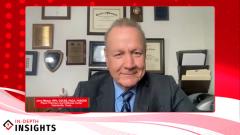
Treatment Adherence Strategies for Patients with Diabetes
Jennifer D. Goldman, RPh, PharmD, CDCES, BC-ADM, FCCP, explores strategies to increase patient adherence to treatment.
Episodes in this series

Jerry Meece, RPh, CDCES, FACA, FADCES: The World Health Organization refers to medication nonadherence as the invisible epidemic. Poor adherence contributes to $500 billion in avoidable health care costs. It results in 25% of all hospitalizations [in the United States]. Looking at your practice, how adherent are your patients with type 2 diabetes? What do you think are the top 3, 4, or 5 barriers that get in the way of them taking their medications properly?
Jennifer D. Goldman, PharmD, RPh, CDCES, BC-ADM, FCCP: The majority of my patients are very adherent. I’m seeing them in an ambulatory care setting at a doctor’s office. If they have an appointment with me, that alone is more motivation. They’re a little more motivated because they have an extra appointment in addition to their doctor’s appointment. That population is already a little more motivated. Why waste their time to talk to me if they aren’t going to be adherent?
That being said, I still have to be cautious in that population to make sure I’m asking the right questions that will help them be adherent. There are lots of reasons that impact adherence in patients. One of the 3 biggest ones would be cost. Financial burden is an issue that we see all over the country and in my practice. How much are the prescriptions? How much are the health care services? Do they have the funds to afford those medications? Does it fit into their budget?
Another issue with adherence that we need to consider is time management, such as forgetfulness. Did they forget to take their medication? Is it part of their routine? Do they have a planner or a pillbox? Last would be a lack of knowledge of benefit or understanding of how to take the medication, what the medication is for, and what they can expect from that medication. Not understanding how to take it, why they’re taking it, or why it has been prescribed clearly can lead to nonadherence.
Jerry Meece, RPh, CDCES, FACA, FADCES: I had an endocrinologist, a sage, who said, “Maybe it would be better if the pancreas hurt a little as your blood glucose got higher.” Because it’s that silent episode that makes us wonder why we’re even taking this medicine. You’re right. We can do these little things like putting your pillbox by your toothbrush every night so that you take your statin. That’s a reminder of the little things day in and day out. Over the years, I’ve found that good communication skills, such as motivational interviewing and active listening, are great tools. You and I have talked about this a lot. They’re powerful tools for locating problems and identifying solutions. Like all these tools, the more you practice, the better you get at it. But you hit on a key point: how we ask the questions. If I were to ask you, “You’re taking 5 to 12 medications. Are you getting all your medications in?” What’s your answer?
Jennifer D. Goldman, PharmD, RPh, CDCES, BC-ADM, FCCP: Automatically, I’m going to want to say yes. We have to be careful. “You don’t miss any medication, do you?”
Jerry Meece, RPh, CDCES, FACA, FADCES: That’s it. Then we back up and we say, “How can I normalize this?” Maybe the better way to ask this question is: “You’re taking 8 medications, and you’ve got a lot of things going on with your diabetes, not to mention the rest of the things going on with your family. Over a 2-week period, how often do you think you miss getting your medications in? Is there one that’s more problematic?” [It’s important to] make sure that we think through those questions.
You mentioned the question of cost. That’s key. There’s a study by John Petit that asks patients who couldn’t afford their medications, “Why didn’t you bring this to your clinician’s attention? Why didn’t you ask them?” There were several answers. One was: “I didn’t think it was important. I was embarrassed to approach them.” Another was: “I didn’t think my clinician could help me.” The No. 1 reason patients never brought it to their clinician’s attention was: “No one ever asked me.” That drives it home to the pharmacists. This is a simple thing.
Sometimes we get that answer by asking, “With all these co-pays and out-of-pocket expenses, is this regimen still within your budget?” If it isn’t, one of our powerful tools as pharmacists is that we can look at generics, biosimilars, and other things that are out there and work on the problem. But if we don’t know it exists, we don’t know how to handle it. It’s something that we all need to make sure we’re paying attention to.
Jennifer D. Goldman, PharmD, RPh, CDCES, BC-ADM, FCCP: It’s important to identify those patients. We don’t necessarily have to do everything for them. We can direct them. We can help them figure out whether they’re being prescribed the drug that’s preferred on their formulary. Are they underinsured? There are a lot of places they can go to get help. Even if there isn’t a generic available, some pharmaceutical companies have patient-assistance programs even for insured patients with co-pays that are too high. For example, during the COVID-19 pandemic, the last few years, they were very generous with insulin and helping patients who can’t afford it.
There are a lot of places we can direct them to help with that, to help prevent that barrier. We can also help solve other issues. If their issue is forgetfulness, we’re in a perfect place to help them set reminders. You talked about putting your medications near your toothbrush. We also need to educate them on why they take their medication and why it’s important. As you said, if your pancreas hurt, they might remember that. If somebody has gastrointestinal reflux, they’re going to remember to take that pill every day because they’ll be punished if they don’t. But most of the time, diabetes, high blood sugar, high lipids, etc, don’t hurt.
Jerry Meece, RPh, CDCES, FACA, FADCES: Statins are probably the biggest culprit of all. Statistics show that 50% of all the statins are off the rails after 1 year. People just stop taking them. If we can explain what’s involved and what’s at risk by getting this in on time, it makes all the difference in the world.
Transcript edited for clarity.
Newsletter
Pharmacy practice is always changing. Stay ahead of the curve with the Drug Topics newsletter and get the latest drug information, industry trends, and patient care tips.

























